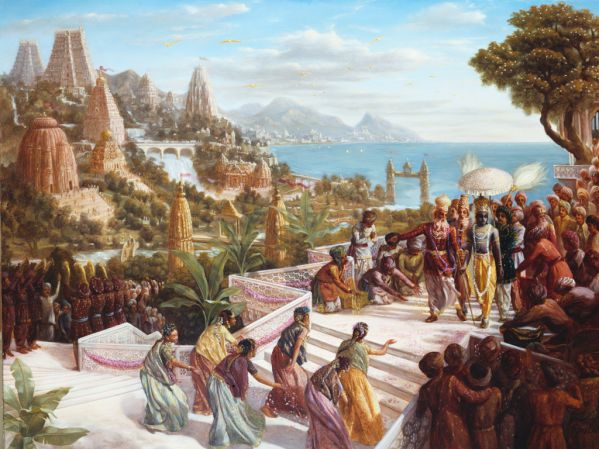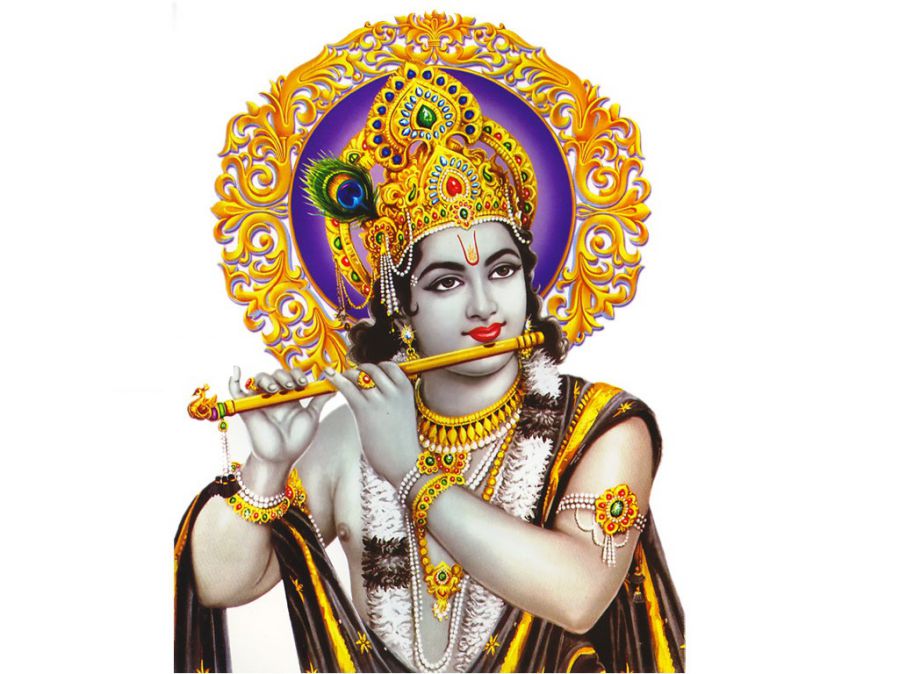When we say Krishna, we should understand the essence of who he is – he is an irrepressible child, a terrible prankster, an enchanting flute player, a graceful dancer, an irresistible lover, a truly valiant warrior, a ruthless vanquisher of his foes, a man who left a broken heart in every home, an astute statesman and kingmaker, a thorough gentleman, a yogi of the highest order, and the most colorful incarnation.
Krishna has been seen, perceived, understood and experienced in many different ways by different people. For example, in Duryodhana words, Krishna is a “smiling rogue if there ever was one. He can eat, he can drink, he can sing, he can dance. He can make love, he can fight, he can gossip with old women, and play with little children. Who says he’s God?” That was Duryodhana’s perception.
Krishna was sporty and his leelas extend in various fields involving various individuals. Some of them are with the milkmaids of Vraja while some involve the Pandavas. He has acquired a lot of names based on these Leelas.
One such story is the how Jarasandha the king of Magadha got killed by the cleverness of lord Krishna which gave him the name of Ranchod.
King Brihadratha of Magadha was married to the twin daughters of the King of Kashi. Brihadratha loved both his wives equally and had all the material joys of the world, but no son. This left him in a depressed state.
The sage Chandakaushika visited his kingdom and Brihadratha served him with respect. Being pleased with his service, the sage granted Brihadratha a boon. Brihadratha asked the sage for a son and the sage gave him a mango, which Brihadratha was to give one of his wives. Now Brihadratha loved both his wives equally so he cut the mango in two equal halves and fed both of them.
Nine months later, both his wives gave birth to a child, or rather half a child each. Seeing this the queens attendants were horrified and decided that they must dispose of the two halves, so they dumped them outside the kingdom. Now outside the kingdom, there lived a demoness named Jara. Sensing human flesh, she found the two halves of the child. Hoping to carry them home to eat them, she placed both the halves side by side in a basket and lo behold the halves miraculously joined up, making one complete human child. Jara realized that this must be the son of the King of Magadha, and wanting a reward, took the child to the palace. The King was overjoyed and named the child Jarasandha in order to honor Jara, the demoness who had saved him.
Jarasandha grew up and became a very powerful king. He defeated many other kings and made them promise their allegiance to him making him supreme emperor. He gave both his daughters in marriage to Kamsa of Mathura.
Now Krishna killed Kamsa, making Jarasandha an enemy. Jarasandha attacked Mathura seventeen times and Krishna decimated his army, sparing Jarasandha alone.
Jarasandha decided to teach Krishna and the Yadavas a lesson. Since the Yadavas were concentrated in and around Mathura, he decided to battle them and destroy the race forever.

Jarasandha then repeatedly attacked Mathura and each time, he caused massive death and destruction. The seventeen attacks that he led on Mathura had sapped the energy of the Yadavas and stunted the growth of the city.
The economy of the Yadavas was in shambles and the wars had emptied the treasury. Jarasandha was a powerful enemy with a huge army and the Yadavas barely managed to withstand his attacks with even the likes of Krishna and Balarama on their side.
One day, Krishna received disturbing news that Jarasandha had forged an alliance with several other kings to forever destroy the Yadava clan.
Jarasandha had entered into an armed alliance with Emperor Damghosha of Chedi, Dantavakra of Karusa, Rukmi of Vidarbha and the brothers Vind and Anuvinda of Avanti. The alliance had only one aim-destroy Mathura and the Yadava clan.
There was more disturbing news for the Yadavas. The Kingdom of Hasthinapur expressed helplessness in coming to the aid of the Yadavas. Meanwhile, the alliance began its march towards Mathura. Thus the Yadavas were left forlorn and at the mercy of a huge force.
The alliance decided to simultaneously attack Mathura from several fronts. Jarasandha then sent a message to the Yadavas stating that they would be spared if they handed the heads of Krishna and Balarama to him.
The Yadavas refused and readied themselves for war. Krishna was the only person who repeatedly cautioned his clansmen against the war. He then hit upon the idea of shifting the capital from Mathura to Dwaraka.
Krishna placed the suggestion before King Ugrasena his grandfather.
Ugrasena and all other courtiers and even the commanders of the Yadava army were against flight. Balarama too was against the move. He wanted to fight against Jarasandha.
Ugrasena then pointed out to Krishna that if he ran away from battle field, he would forever be known as a Ranchod or one who has run away from a battle field.
Krishna retorted that he had no worry about any new name being given to him. “I already have many names and one more does not make any difference”, he said. Moreover, I am willing to sacrifice my reputation for saving my people and their lives”, he said.
When Balarama again raised the war cry, Krishna gently reminded him that war is not the solution for solving all the problems. He said the confederacy of kings against Mathura is so great that it would lead to the death of countless people.
“Why should people suffer because of me and Balarama”, he asked the gathering. He then suggested that the best solution would be leave the city and go to a new place where it would be difficult for Jarasandha to attack them.
He reminded the gathering that Jarasandha had already attacked Mathura seventeen times and he would not rest till he succeeded in his mission of exterminating the Yadava clan.
It was then that Ugrasena pointed out that if Krishna’s suggestion to flee Mathura was accepted, Krishna would forever be labeled a Ranchod – a man who had run away from the battlefield.
Krishna did not flinch and answered that he is known by several names. He again renewed his suggestion to leave Mathura.
The gathering reluctantly accepted the suggestion but Ugrasena wanted to know how a new city could be built in such a short span of time. The Magadha Army was already near Mathura and it would reach the city in a matter of days. “Then, how can a new city be built in days”, he asked.
Krishna then replied that he had already requested Vishvakarmaa, the architect of Gods, for help. He then prayed for Vishvakarmaa to appear before the Mathura court. When the architect came, Krishna asked him to show Ugrasena the plan of the new city.
Vishvakarmaa showed the court the plan of Dwarka. The entire gathering was stunned at the beauty of the city.
“How much time do you need to construct it”, asked Ugrasena of Vishvakarmaa.

The architect replied that the city had already been built but that it was under water. Please give me your permission and I will raise Dwarka from the ocean and place it on land. It will be ready for immediate occupation.
When all the Yadavas unanimously gave their consent, the capital was shifted to Dwaraka. When Jarasandha and his army reached Mathura, they were met with an empty city. An enraged Jarasandha put the city to destruction and called Krishna a coward – Ranchod – a man who had run away for battle.
Krishna, though appeared unfazed by the new name. He knew that it would be better of one sacrificed his name and fame for the good of people.
Krishna had five cousins, the Pandavas, who had just acquired a kingdom -Indraprastha. The eldest Pandava, Yudhishtra wanted to perform the Rajasuya Yagyas. In order to perform the Rajasuya yagna, a king had to be declared emperor and all the surrounding kingdoms had to recognize the emperor as their overlord. In order for this to happen, Yudhishtra would have to defeat Jarasandha and obtain the title of emperor. Yudhishtra, not knowing how to go about this, asked Krishna for help. Krishna said that he, Arjuna (the third Pandava) and Bheema (the second Pandava) would dress up like Brahmans and go to Magadha and challenge Jarasandha to a wrestling match.
Upon reaching Magadha, Krishna, Arjuna and Bheema challenged Jarasandha to a wrestling match. Jarasandha seeing their physiques realised that these were not Brahmans and asked them who they were. Krishna revealed their identities and told Jarasandha that they had come to challenge him and that Jarasandha must pick an opponent. Jarasandha said that he would not fight Krishna as he was a cowherd and he did not match his dignity and social standing. He then refused to fight Arjuna saying that Arjuna was too young, but he agreed to fight Bheema as Bheema seemed mighty and a worthy opponent.
Bheema and Jarasandha fought for days, both equally matched and neither succumbed to the other’s blows. Bheema realizing that Jarasandha was an equal match looked to Krishna for help. Now Krishna who knew the story of Jarasandha’s birth, picked up a twig from the floor, broke it in two halves and threw the two halves far away from each other.
Bheema now knew what he must do. He threw Jarasandha to the ground, held his legs and split his body in two. He then threw the two halves of Jarasandha far away from each other so that they might not join. Bheema had defeated Jarasandha and Krishna installed Jarasandha’s son as the king of Magadha. In return, Jarasandha’s son agreed to be a vassal to the Pandavas.
However, even today, Krishna is also known as Ranchod in Gujarat – Ran meaning war and Chod meaning run away. Having run away from battlefield, he was given the name Ranchod.
What we can interpret from this episode between lord Krishna and Jarasandha is that the conventional way is not always the option, sometimes to defeat the crisis we have to think on a different tangent.
![]()
Articles of Lord Krishna You May like






